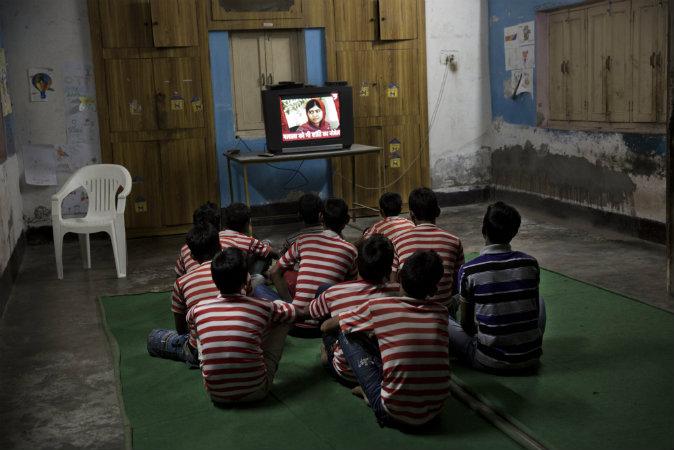PATNA, India — When the Nobel Committee announced that Indian children’s rights activist Kailash Satyarthi had won the Peace Prize, a skinny 13-year-old boy was running around serving cups of milky tea to customers at a tiny tea stall in eastern India.
By law, Raja Manjhi should not be working at all. But, like millions of other children across India, he has been forced out of school and into a job to help his impoverished family.
Despite the country’s rapid economic growth, child labor remains widespread in India, where an estimated 13 million children work, with laws meant to keep kids in school and out of the workplace routinely flouted.
Satyarthi, 60, who won the Peace Prize on Friday along with 17-year-old Pakistani Malala Yousafzai, accepts that “a lot of work still remains” before children like Raja no longer have to work.
Raja dropped out of school in second grade, when he was handed over to the owner of a tea stall in the eastern city of Patna to pay off his father’s 5,000 rupee ($80) debt. The money was needed because Raja’s mother was sick.
He has no idea what a Nobel Prize means. And he has no idea when his father’s debt will be repaid so he can go back to his village.
Across India, children — some as young as 5 or 6 — end up working in all sorts of jobs. Many, like Raja, are in bonded labor, bound to their employers in exchange for a loan and unable to leave while in debt, which can last forever.
Others, like 13-year-old Srabani Das, need money so their impoverished families can eat.
Srabani, still a child herself, is a baby sitter for a middle-class family’s 1-year-old girl in the eastern city of Kolkata.
It’s a job she has had for a year and which pays only about 800 rupees ($13) a month, which she sends home to her family of poor farm laborers. Srabani lives with her employers, and has no fixed work days or time off.
Srabani has heard of the Nobel Prize, thanks to receiving a bit more of an education than Raja after studying up to the sixth grade.
She was happy that an Indian had won the award, but added, “It won’t change my life.”
For more than three decades, Satyarthi and the organization that he founded, Bachpan Bachao Andolan, or Save the Children Movement, has worked to rescue children like Raja and create awareness to keep others like Srabani in school.
In 2006, India banned the hiring of children under 14 as servants in homes or as full-time workers in restaurants, tea shops, hotels or spas, mandating that they must remain in school. But such laws can be nearly impossible to enforce.
It’s not unusual to find girls as young as Srabani, and sometimes even younger, taking care of an infant for a middle-class family. Across the country, they are found in upscale shopping malls and fancy restaurants, entertaining children while the parents shop or dine.
In return, they earn a pittance, as well as food and a place to sleep, which is usually in the family’s living room or on the kitchen floor.
For the children themselves, the issue is not as clear-cut as many outside India would think. They come from bitterly poor families, and in many cases are their families’ sole breadwinners.
Rohit Kumar came to the northern Indian city of Lucknow two years ago, when he was only 11. His father worked at a construction site, while he worked at roadside food stalls.
His father went back to their village last year, but Rohit stayed behind to work at a tea stall, where he works up to 15 hours a day washing utensils and serving customers.
“I like this job,” he says, adding that it fetches him two meals a day and about 800 rupees ($13) a month, more money than he has ever had in his life.
But Rohit does not go to school and gets sad when he watches other children play cricket on the streets or in playgrounds.
“I want to play cricket,” Rohit says. “I have seen how children play this game, but I do not have enough time.”
And what of the law that makes his job illegal?
“I serve tea at the local police station. All the cops know me,” he says. “So who will enforce the law?”
___
From The Associated Press
Naqvi reported from New Delhi. Associated Press writers Biswajeet Banerjee in Lucknow, India, and Manik Banerjee in Kolkata, India, contributed to this report.

